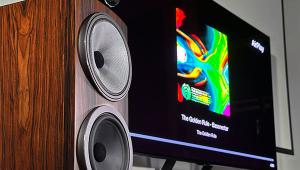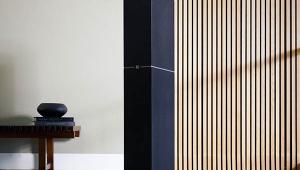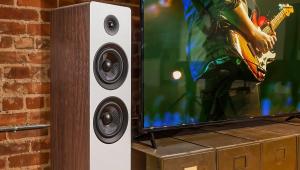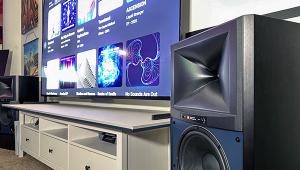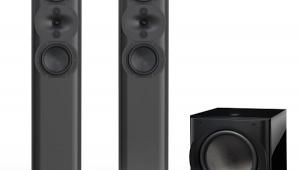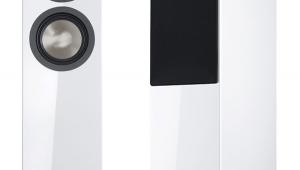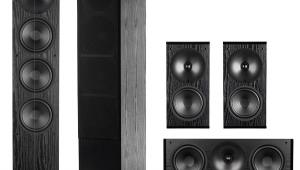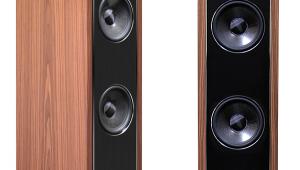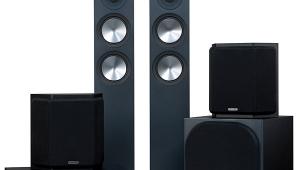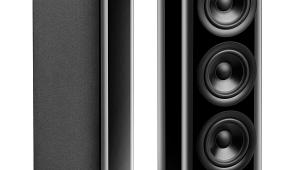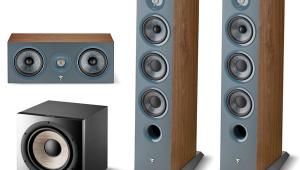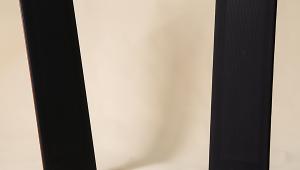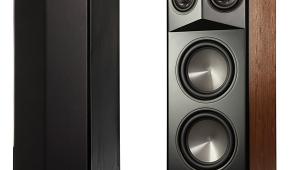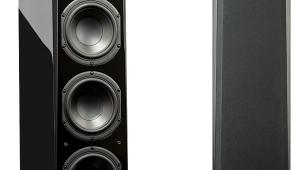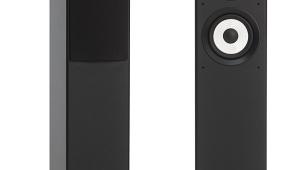The Revel Concerta F12 Surround Sound Speaker System

For example, you probably will not find Hitachi's high-end "Director's Series," or Toshiba's "Cinema Series" televisions at the big chain stores. These higher-performance, more expensive models are sold through specialty retailers, and the differences are often more than cosmetic.
Revel is a "high-end" speaker division of Harman International. You won't find Revel at the big chains, but you will find the brand at smaller ones like Harvey's. The Concerta is the newest line of Revel models, and the least expensive by far. But unlike the "budget" lines from many manufacturers, it was not created to sell through a different distribution channel. Rather, Revel dealers, who are chosen for their ability to properly demonstrate the company's speakers, asked for a line they could offer consumers who are Revel enthusiasts, but who don't have deep enough pockets for the more expensive Performa and Ultima models. The Concerta line also gives Revel dealers an opportunity to attract less affluent home theater fans to their stores.

The Revel Rundown
As soon as I took the Revel F12 towers ($1298/pr), M12 surrounds ($648/pr), C12 center ($499) and B12 subwoofers ($999) out of their boxes, I was struck by some visible and technical similarities with the Beta series from Infinity that I had recently reviewed. (Infinity and Revel are sister speaker brands from parent company Harman International). These included the same driver complement, a waveguide-loaded tweeter, and similar (but not identical) cabinet sizes and weights.
Revels also makes use of the C.M.M.D. (Ceramic Metal Matrix Diaphragm) material we first saw in an Infinity speaker, the Prelude MTS System, back in the July/August 2000 issue of the Stereophile Guide to Home Theater. Revel calls their version "Organic Ceramic Composite" (OCC).
The Concerta B12 subwoofer includes a single-band Room Eq parametric equalizer, as does the similarly-sized Infinity CSW-10 (in Infinity-speak, R.A.B.O.S., for Room Adaptive Bass Optimization System). While Infinity provides a proprietary SPL meter, a handy gauge for shaping the amplitude and "Q" of the bass "bump" and detailed instructions on setting the R.A.B.O.S. controls, Revel provides a test CD and a program you can download from its website for setting the B12's Room Eq controls. Unfortunately, the program is not MAC compatible so I was unable to use it. Fortunately, I had kept the paper listing the settings used for the CSW-10, so it was easy to get the front B12 set up. Revel's chief designer Kevin Voecks suggested I try a second B12, which I did, but I was unable to set up the second B12's room optimization other than by ear.

Apart from clearly visible similarities, however, there are significant differences. The drivers' surrounds are black in the entire Concerta line and specified as butyl for greater excursion capability, whereas, the Beta B50's (and the entire Beta line) are grey (with the material not specified). In addition, Revel's drivers have die-cast frames; the Infinities do not. The tweeter waveguides are shaped differently.
According to Revel, the Concerta crossovers are also significantly different, with different crossover points, higher-order slopes, and Polypropylene rather than Mylar caps in critical areas. The Concerta's filter networks are said to be built to a 3% tolerance, the grilles are different (designed for better on- and off-axis sound). (The speakers also measure quite differently—see "Measurements"—TJN.)
The Concertas are a little more expensive, due not only to the above differences but also to their more attractive (to some) faux wood finish and equally attractive (to some) gray front baffle plate, visible with the grille cloth removed.
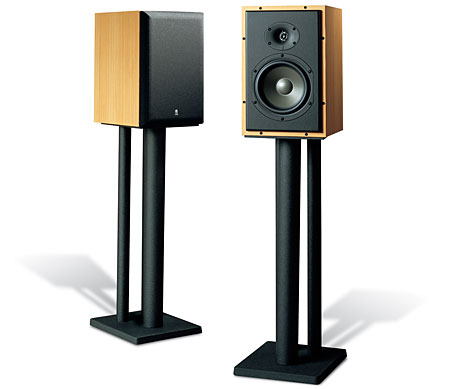
While the Concerta series also includes a bipole/dipole surround speaker (the S12), at our request Revel sent a pair of two-way M-12 bookshelf designs for the surround channels.
So there you have it: in the car world this would be similar to the VW Touareg and the Porsche Cayenne. Or perhaps more like Buick and Oldsmobile in the 1950's—an analogy guaranteed to piss off both Infinity's Eli Harrary and Revel's Kevin Voecks, so Buick and Oldsmobile it is!
Setting Up
The Infinity system's carpet indents were still fresh when I installed the Revel system, so placing the front B12 sub and left and right channel F12s was easy. And with the C12's set top position pre-ordained, only the second B12 and the two direct radiating surround speakers required any additional time and thought. I started with the M12s on the ear-level stands pointed directly at the listening position. The second B12 went next to the couch, half way across the long room, against the back wall. Guesswork got it dialed in.
The Sound
After letting the assemblage break in, warm up, and whatever else happens (or not, according to some) after speakers produce sound for a week or so, I took out my Infinity listening notes and played the same audio and video recordings. If you've read the Infinity review, you'll recall that I found it to be an exceptional performer for its price.

Starting with the critical center channel C12: I found its response to be satisfyingly similar to the C360's, but somewhat sweeter, more coherent and more inviting without getting either "chesty" on the bottom or losing intelligibility in the presence region. I had predicted a bit of boost on axis in the C360's 'presence' region, and indeed, TJN reported ". . .some mild prominence in the region from 500Hz to 2kHz—which may add a bit of emphasis to voices. . .." My impression of the C12 suggests a somewhat smoother on-axis frequency response. Off-axis response will probably be similar to the C360's. Though $100 more than the Infinity C360, Revel's C12 is an impressive performer given its still reasonable cost.
- Log in or register to post comments

